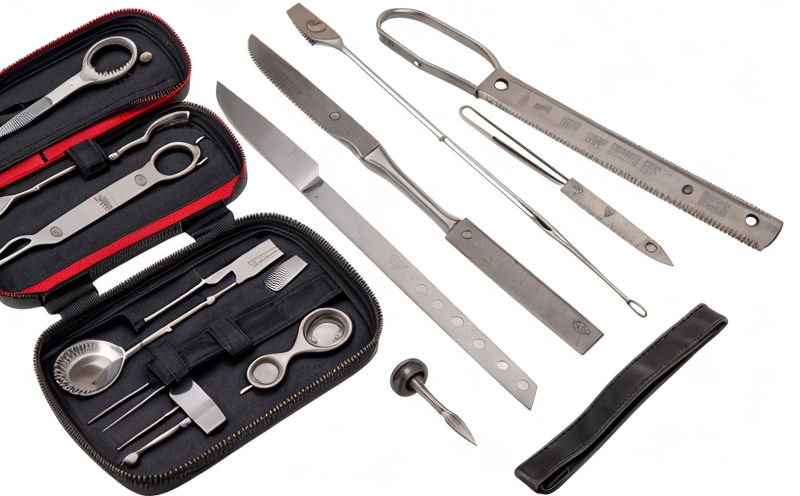Reusability Cycle Testing of Reprocessed Surgical Instruments
The reusability cycle testing of repurposed surgical instruments is a critical process in healthcare settings. This service ensures that surgical tools can be safely and effectively reused without compromising patient safety or operational efficiency. In this era of increasing environmental consciousness, the ability to reprocess and reuse medical devices has become essential for hospitals and clinics aiming to reduce costs and waste.
Reprocessing involves a series of steps including cleaning, disinfection, drying, sterilization, packaging, and storage. Each step is crucial in ensuring that instruments are free from contamination and can be safely reused. The reusability cycle testing focuses on assessing the integrity and functionality of these instruments post-reprocessing.
Our laboratory uses advanced equipment and follows international standards to conduct this testing. We use ISO 15883-2, which provides guidelines for the reprocessing of surgical instruments, as a benchmark. This standard ensures that our tests are consistent with global best practices in medical device reprocessing.
The testing process involves several critical stages:
- Specimen Preparation: Instruments are carefully selected and prepared for testing to ensure they represent the typical conditions under which they will be used.
- Cleaning and Disinfection: The instruments undergo a thorough cleaning process followed by disinfection. This step is crucial in removing any trace of previous use or contamination.
- Stability Testing: Instruments are subjected to various cycles that simulate real-world usage conditions, including temperature changes, mechanical stress, and exposure to biological contaminants.
- Functional Assessment: The instruments are tested for their ability to perform their intended functions under the reprocessed state. This includes checking for any deterioration in performance or increased risk of failure.
- Biofilm Testing (Optional): For certain high-risk instruments, we conduct biofilm testing to ensure that no harmful organisms remain on the surface after cleaning and disinfection.
- Cleaning Efficiency: We assess how effectively the reprocessing cycle removes organic matter from the instrument surfaces. This is critical in preventing cross-contamination between patients.
The results of these tests are meticulously documented, providing a comprehensive report that outlines the performance and safety of the instruments under test conditions. This information is invaluable for healthcare providers who rely on reprocessed surgical tools to meet their operational needs while adhering to strict regulatory requirements.
By ensuring that repurposed surgical instruments meet stringent quality standards, our service supports a more sustainable approach to medical device usage in hospitals and clinics worldwide.
Why It Matters
The reusability cycle testing of reprocessed surgical instruments is crucial for maintaining patient safety and operational efficiency. Reusing surgical tools not only reduces the environmental impact but also significantly lowers healthcare costs. However, it is imperative that these instruments are thoroughly tested to ensure they remain safe and effective after each use.
Failure in reprocessing can lead to contamination or functional degradation of the instruments. This could result in increased risks for patients, including surgical site infections, which have serious health implications. Moreover, non-compliance with regulatory standards can lead to legal penalties and reputational damage for healthcare facilities.
Our service helps hospitals and clinics comply with international standards such as ISO 15883-2, which specifies the reprocessing of surgical instruments. By adhering to these guidelines, we ensure that our clients are up-to-date with global best practices in medical device reprocessing. This not only enhances patient safety but also supports sustainable healthcare practices.
Through rigorous testing and comprehensive reporting, our service provides valuable insights into the performance and reliability of repurposed surgical instruments. These insights enable healthcare providers to make informed decisions about their reprocessing protocols, ultimately leading to safer and more efficient operations.
International Acceptance and Recognition
- ISO 15883-2: This international standard provides comprehensive guidelines for the reprocessing of surgical instruments. Compliance with this standard ensures that our testing results are widely accepted in healthcare settings globally.
- AAMI T10: Another important document, AAMI T10, focuses on the sterilization and disinfection methods used in medical device reprocessing. It is a key reference for ensuring the safety and effectiveness of repurposed instruments.
- CSS 79: The CSS 79 standard is widely recognized in Europe for its recommendations on cleaning, disinfection, packaging, storage, and sterilization of medical devices. Our testing aligns with these standards to ensure broad international acceptance.
Environmental and Sustainability Contributions
The reusability cycle testing of reprocessed surgical instruments plays a vital role in promoting environmental sustainability within the healthcare industry. By ensuring that instruments are safely and effectively reused, our service helps reduce the demand for new medical devices, thereby minimizing waste generation.
According to reports from organizations like the World Health Organization (WHO), reducing waste and resource consumption is essential for sustainable healthcare practices. The reprocessing of surgical instruments not only aligns with these goals but also supports financial efficiency in healthcare settings.
In addition, our service helps facilities achieve compliance with environmental regulations, such as those outlined by the European Union's Waste Electrical and Electronic Equipment Directive (WEEE). By ensuring that repurposed instruments are safe for reuse, we contribute to a circular economy model within medical device reprocessing.
Through rigorous testing and adherence to international standards, our service supports hospitals and clinics in their journey towards more sustainable operations. This not only benefits the environment but also enhances patient safety and operational efficiency.





